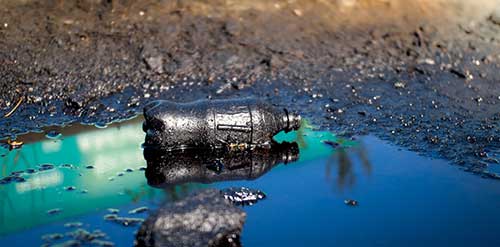Hyundai Motorstudio Senayan Park
Hyundai Motorstudio Senayan Park
Newsroom
-
Soil Pollution Definition, Its Impact and How to Handle It
- Hyundai Motorstudio Senayan Park 2022.06.21
-
We often look up too much when discussing pollution when the real problem lies beneath us: the soil. Yes, soil pollution!
The land where all our needs grow is currently suffering, unfortunately this is the consequences of our behavior as humans. The impact is immediate for us, for example the soil fertility and water sources are decreasing.
As human beings, it is our job to understand the cause, the effects, then map out the concrete approach to overcome them so this condition does not get worse.
What is Soil Pollution?
Soil is the earth's crust, which is sometimes sensitive to climate changes or other irritants. Just as human skin that is sensitive, soil feels the same effect when exposed to chemicals.
Soil pollution can be defined as soil that loses its nutrients and minerals due to chemical substances that pose a risk to the human and their ecosystems. Regardless of the type of chemical and its concentration level, soil pollution is a global issue that affects economic, social, and ecosystems.
For instance, benzene compounds that are exposed to the soil can increase the risk of leukemia through the food chain. Soil degradation can occur when the soil is contaminated by chemical compounds, which occurs due to industrial activities and human behavior.
Chemical substances can damage the diversity of minerals in the soil. The plastic or garment industry that releases chemical substances are among the causes of soil pollution. Natural phenomena such as erosion and flooding also contribute to soil degradation.
But if you look closely, soil pollution actually occurs because of human activities, both directly and indirectly. Industrial activities arise because of human needs which, unfortunately, are not accompanied by proper waste management.
Soil Pollution Effect
Everything about soil pollution has bad connotations for humans and the environment. The effects are quite diverse. Besides the ecosystem, economic and social aspects are also affected.
1. Damaging Health
What must be understood is that soil pollution can have a bad impact on health through the food chain which triggers certain types of diseases, depending on the exposure. If the waste is classified as carcinogen, it will lead to cancer.
2. Soil Degradation
Chemicals in pollutants can damage organic minerals in the soil. What happens next, the soil loses its fertility because minerals and nutrients are replaced by harmful compounds. If the degraded land is planted with plants, the harvest will be bad, both in quantity or quality.
3. Climate Change
In just a decade, soil degradation has released 4 billion tons of carbon dioxide into the atmosphere. Something that hasn't happened before. Soil should be a medium for plants to live, but because the quality of the soil decreases, trees cannot grow and carbon is not absorbed optimally.
4. Water and Air Pollution
Soil pollution also triggers air and water pollution. For the same reason, plants that act as carbon sinks cannot do their job. Plants, through their roots, act as a water storage and absorb carbon through their leaves. Soil contamination weakens these functions, perhaps even eliminating them.
5. Migration
Climate change, along with soil pollution, is predicted to trigger a major migration in 2050. As a result, the population becomes unbalanced in one area which will erode natural resources rapidly.
6. Species Extinction
Soil pollution is one of the causes for mass species extinctions in Earth's history. Currently, the extinction of vertebrate species has occurred up to 38%, between 1970-2012.
7. Desertification
It is estimated that the number of people living in arid areas will reach 45% of the world's population by 2050. The arid areas are areas with low fertility rates. At the same time, the arable area of the world has decreased by 87% in just the last three decades.
8. Economy
For those who depend on land for their livelihoods, such as agriculture, there is a massive economic impact. The harvest will not be as good as it used to be, so there will be a decrease in income.
How to Handle Soil Pollution
Soil degradation continues to happen, and if humans ignore these conditions, the future earth is very likely to be uninhabitable. More concrete action is needed to prevent the deterioration of soil.
But soil pollution is a complex problem that requires intervention from all parties such as the government, institutions, communities, and individuals.
Consuming organic food, disposing of batteries properly, making compost, and storing medicines according to procedures are concrete steps to overcome soil pollution for each individual.
For industry, the use of renewable energy and organic materials is highly recommended, especially for any industrial activity that generates waste. This includes planning a sewage treatment system.
For the government, regulations that limit soil pollution must be applied with a comprehensive control system. Waste management must be improved through sustainable conservation.
The same goes for the community that lives in a certain area. Because they understand the area better, the way to handle any soil pollution can be adapted to local wisdom to avoid social conflicts arise.




